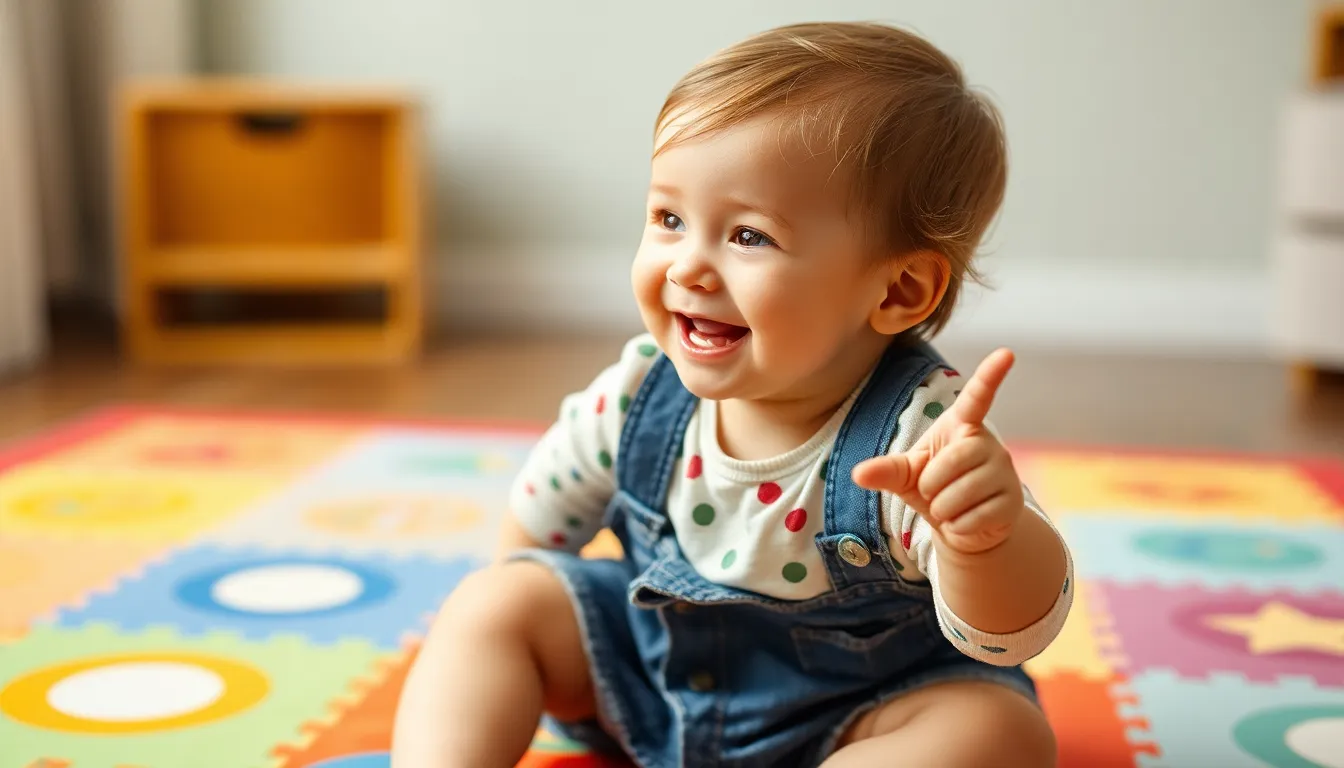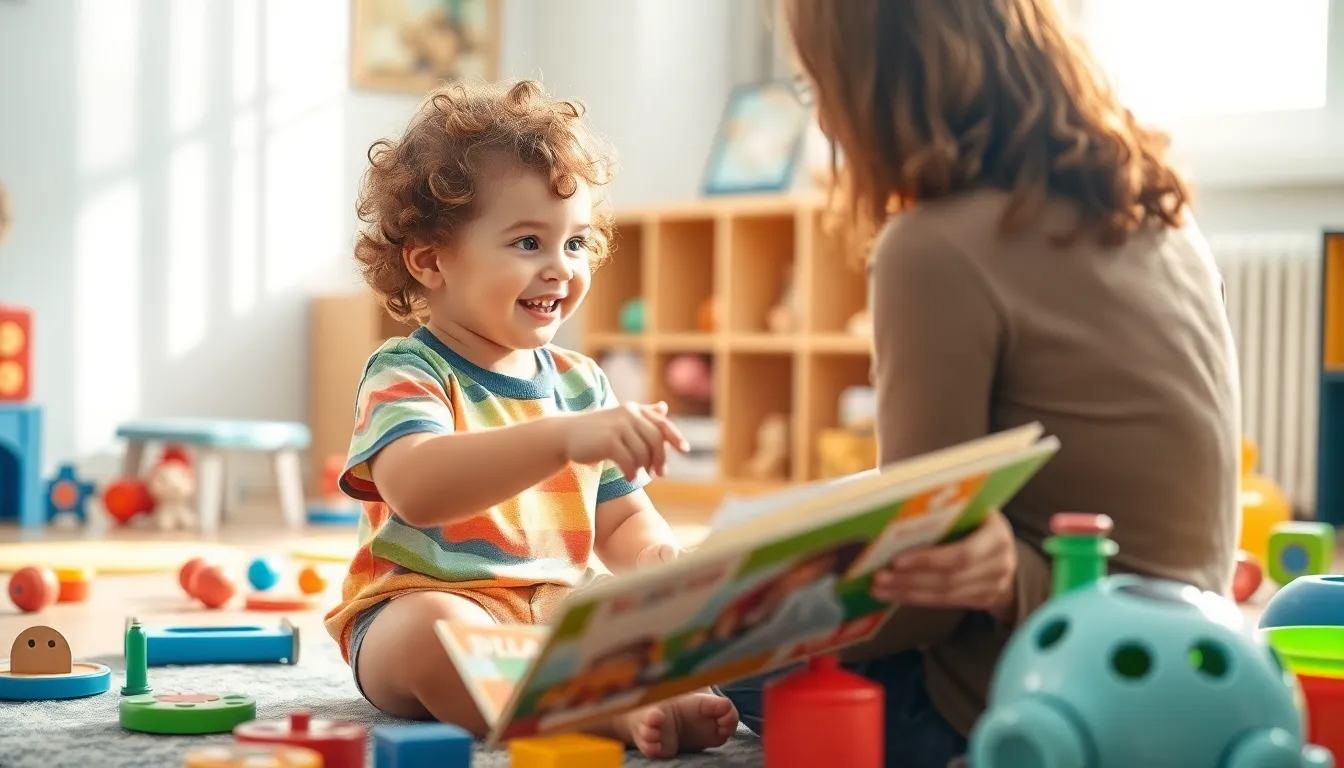Watching a toddler try to express their thoughts can be both hilarious and enlightening. One moment they’re babbling like a mini philosopher, and the next, they’re throwing a tantrum because you didn’t understand their complex request for “more juice.” Communication skills in toddlers are a fascinating journey filled with giggles, frustration, and plenty of “What did you just say?” moments.
Table of Contents
ToggleUnderstanding Toddler Communication Skills
Observing toddlers during their communication development offers a rich mix of humor and insight. Understanding their communication skills can reveal key aspects of their growth.
Importance of Early Communication
Early communication sets a foundation for social interactions and cognitive development. Toddlers who express themselves clearly tend to build stronger relationships with caregivers and peers. Language skills influence academic success and emotional well-being. Engaging toddlers in conversations, even during babbling, supports their linguistic growth. Encouragement reinforces their efforts, making them more eager to communicate. Recognizing their attempts fosters confidence and strengthens communication bonds.
Developmental Milestones
Developmental milestones indicate typical communication progress in toddlers. By 12 months, most toddlers say a few simple words and understand basic commands. Around 18 months, vocabulary expands to 50 words or more, often including names of objects and people. By age 2, children start forming simple sentences, demonstrating their ability to combine words effectively. Understanding these milestones helps caregivers identify areas requiring support. Clarity in a toddler’s speech often correlates with emotional expression and social skills. Awareness of these benchmarks promotes timely interventions, if necessary.
Types of Toddler Communication Skills

Toddler communication skills encompass both verbal and non-verbal avenues that young children utilize to convey their thoughts and needs. Understanding these types helps caregivers support their development effectively.
Verbal Communication
Verbal communication involves spoken words and sounds. By 12 months, toddlers typically say their first simple words, like “mama” or “dada.” As they reach 18 months, many expand their vocabulary to include around 50 words. Forming simple sentences occurs around age 2, with phrases such as “want cookie” or “go park.” Encouraging verbal skills can include reading aloud and engaging in dialogue. Caregivers might ask questions to prompt responses. These interactions foster linguistic growth and confidence.
Non-Verbal Communication
Non-verbal communication plays a critical role in how toddlers express themselves. They often use gestures, such as waving or pointing, to indicate their desires. Facial expressions convey emotions, with smiles indicating happiness or frowns showing displeasure. Additionally, body language can signal excitement or distress. Understanding these signals helps caregivers respond appropriately to a child’s needs. Encouraging gestures alongside words promotes a richer communication experience. Recognizing and validating non-verbal cues supports a toddler’s confidence in expressing themselves.
Factors Influencing Communication Development
Several factors impact the development of communication skills in toddlers. Understanding these influences can enhance effective support strategies.
Environmental Influences
Environment plays a significant role in shaping communication skills during toddlerhood. Exposure to rich language environments boosts vocabulary acquisition. Frequent social interactions with family members and peers facilitate the development of conversational skills. Activities like playing together or reading aloud promote language exposure, aiding in cognitive and linguistic growth. A stimulating environment filled with diverse sounds and words encourages toddlers to experiment with language. Quiet, limited interactions might hinder their ability to express themselves fully.
Parental Involvement
Parental involvement significantly affects a toddler’s communication development. Engaging in conversations and modeling expressive language provides essential learning opportunities. Reading books aloud regularly fosters a love for language and introduces new words. Encouraging toddlers to express their thoughts or feelings helps build their confidence in communication. Additionally, responsive interactions, such as acknowledging a toddler’s attempts to communicate, strengthen this skill. Parents who actively listen and respond create a safe space for open expression, promoting effective language use.
Encouraging Effective Communication in Toddlers
Supporting toddlers in developing their communication skills involves engaging activities and effective techniques parents can use. Essential interactions lay the groundwork for confident expression.
Activities and Games
Interactive play nurtures communication development. Singing songs with repetitive lyrics encourages toddlers to join in and express themselves. Storytime enhances vocabulary growth, while asking open-ended questions allows toddlers to share thoughts. Simple games like “Simon Says” promote understanding of language nuances through movement. Encouraging toddlers to point out objects during play fosters their descriptive skills. These activities stimulate both verbal and non-verbal communication.
Communication Techniques for Parents
Parents play a vital role in effective communication. Active listening is crucial; responding to toddlers’ cues shows validation. Use simple, clear language, which helps toddlers grasp new concepts. Modeling expressive language showcases various vocabulary uses. Engaging in regular conversations about daily activities encourages toddlers to participate. Asking thoughtful questions stimulates critical thinking and encourages expressive responses. Encouraging toddlers to narrate their experiences allows for language practice.
Toddler communication skills are a vital aspect of early development that shapes a child’s future interactions and relationships. By recognizing and nurturing both verbal and non-verbal communication, caregivers can significantly enhance a toddler’s ability to express themselves. Engaging in meaningful conversations and providing a supportive environment fosters confidence and encourages language growth.
Through playful activities and responsive interactions, parents can create enriching experiences that promote effective communication. As toddlers navigate their world of words and gestures, their journey becomes not just a learning experience but a delightful exploration of connection and understanding. Investing time and effort in this critical stage can lead to lasting benefits in a child’s social and cognitive development.





